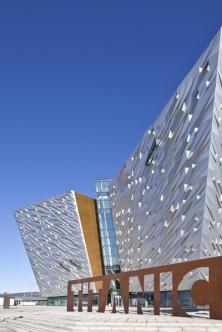One hundred years after the birth of the world’s most famous ship, the £97 million
Titanic Belfast has become a major new tourist attraction for Northern Ireland. Its centrepiece is a stunning recreation of the Titanic’s iconic Grand Staircase by Torquay-based architects Kay Elliott.
Titanic Belfast is an iconic 14,000 sq m (150,700 sq ft), six-floor building featuring nine interpretive and interactive galleries that explore the sights, sounds, smells and stories of Titanic, as well as the City and people which made her. The world’s largest Titanic visitor experience accommodates a dark ride, underwater exploration theatre, recreations of the ship’s cabins, interactive technologies and a luxurious conference and banqueting venue, the Titanic Suite
As faithful to the original as modern building regulations and design constraints allow, the recreation of the staircase is the focal point of the 1,000-seater Titanic Suite, Belfast’s largest dedicated banqueting space. The near-replica Grand Staircase is 23ft high and 24ft wide, has 23 steps, weighs nearly four tonnes and is made up of 10,000 individual parts. It was built in six separate sections using red oak, the same wood which was used for the Titanic’s Grand Staircase. Six joiners worked on the project and it’s estimated to have taken 1,500 man-hours over four months to complete.
The challenge of matching the craftsmanship of original designers Harland & Wolff was met by Oldtown Joinery, a specialist joinery firm from Bellaghy, Co. Londonderry, using materials and techniques similar to those used in the shipyard 100-years ago.
Alongside the design of the staircase, Kay Elliott was also responsible for the interior design, making sure a high quality visitor experience was created. Titanic Belfast includes four public entrances, a four storey atrium, temporary exhibition galleries, the 1,000 seat banqueting suite/conference centre, pre function areas, education and community facilities, restaurants, retail spaces and an underground car park.
Mark Muir, Kay Elliott’s Project Director for Titanic Belfast, said: “A major challenge was the lack of complete drawings of the original staircase. We developed a detailed 3D technical model based on photographs of the original staircase onboard Titanic’s sister ship Olympic - a job which involved painstaking detective work over several months so we could be as true to the design as possible. The result is a stunning centrepiece of the Titanic, located on the top two floors of the attraction, that itself offers a journey through history, showcasing key points in the Titanic ship’s life. It is also testament to the skills of the many designers and craftsman involved.”
Tim Husbands, Titanic Belfast’s CEO, added: “Titanic’s Grand Staircase is one of the most well-known focal points of the world’s most famous ship and is synonymous with the grandeur of Edwardian society. Titanic Belfast is the world’s largest Titanic visitor attraction and we want to bring the Titanic story alive for our visitors and guests from all over the world and replicate the timeless elegance that was designed to impress the first class passengers onboard. Kay Elliott and Oldtown Joinery have done a superb job on an extremely intricate and detailed process – virtually every part of the near-replica Grand Staircase has been hand crafted in the traditional way.”




















